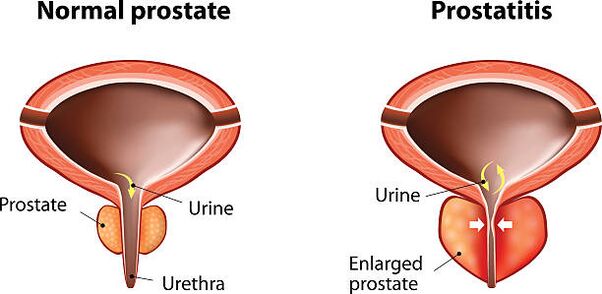Prostatitis is an inflammatory process that develops in the glandular tissue of the prostate, sometimes with transition to the muscular part of this organ.This causes pain in the perineum, weakness, fatigue, problems urinating, and sexual dysfunction.It is necessary to treat acute prostatitis to avoid dangerous complications of this disease.

Currently, both the causes and the processes that occur in prostatitis are well studied.Therefore, a urologist has a wide arsenal of means to treat this disease.They should be prescribed only by a specialist who has knowledge of which parts of the development of the disease are affected by a certain drug and who also takes into account contraindications.Let's consider the main groups of drugs used to treat prostatitis.
Antibacterial agents
Most often, prostatitis is caused by bacteria.Antibacterial medications are directed against them.
To achieve a specific effect on the bacteria that caused prostatitis in a particular person, it is necessary to conduct a bacteriological study of the secretion secreted by the prostate.Only after knowing the name of the microorganism, what its properties are and what antibacterial agents it is sensitive to, can the appropriate antibiotic be chosen.And modern drugs of this type can cure even severe forms of the disease.For acute bacterial prostatitis, the following antibiotics are used:
- amoxicillin;
- Ceftriaxone;
- cefotaxime;
- ofloxacin;
- ciprofloxacin;
- Azithromycin.
This is not a complete list of antibacterial medications used in the treatment of prostatitis.
Antiviral treatment
If prostatitis has a herpetic etiology, it is treated with antiviral drugs.This:
- acyclovir;
- valcyclovir;
- Ffamciclovir.
The latter drug is the "gold standard" for the treatment of viral prostatitis.
Non-steroidal anti-inflammatory drugs
Medications such as diclofenac, indomethacin, ketoprofen or ketorolac are needed not so much to eliminate the pain syndrome that accompanies this disease, but to reduce the swelling of the gland and its inflammation.They also contribute to the appearance in the blood of substances that alleviate the manifestation of intoxication and reduce elevated body temperature.
The optimal drug that combats inflammation is diclofenac, which also eliminates pain very well.If the pain is especially strong and acute, ketorolac is used.
Medicines that eliminate spasms.
In the treatment of prostatitis, medications are used that act on several key points of spasm of the pelvic and prostate muscles.This allows you to improve urination and help medications from the previous group eliminate pain.So here they apply:
- Drotaverine: acts on smooth muscles, making the reaction that causes muscle spasm impossible;
- Baclofen: reduces the sensitivity of nerve fibers coming from the prostate and poisonous organs;
- Tamsulosin: acts only on those receptors found in the muscles of the bladder and prostate.
Auxiliary medications
A good addition to the treatment of prostatitis are the following medications:
- Prostate extract - the drug protects prostate cells from damage due to inflammation, improves microcirculation, eliminates congestion in the pelvic vessels and strengthens blood vessels.All these effects are extremely useful for chronic prostatitis.Being of animal and non-chemical origin, it does not cause side effects.It can be used in the form of injections or suppositories.
- Creeping palm fruit extract.This is a herbal remedy that has a powerful anti-inflammatory effect.It also regulates the volume and force of urination and reduces the discomfort that occurs when going to the bathroom.
- Bioactive dietary supplement that contains a complex of proteins and nucleoproteins isolated from the prostate gland of cattle, which affects the metabolism of the prostate, normalizing its function and, consequently, urination.

























